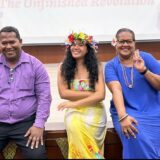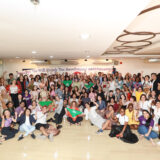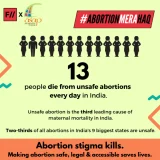Debating Right from Wrong: What are Medical Morals?
– Shreeya Mashelkar, Youth Champion, India
How do we decide what’s wrong and what’s right? Every time we read a piece of news in the daily newspaper, or hear opposing views in an argument, we make up our mind as to which side we support. We presume our decision is the right one, backing it with our own reasons. What makes us go through these decision making tasks? How do we come to these positions? Most people call it their moral compass.
We all grow up with an array of opinions and rules thrown at us. Everyone, from family members, to teachers, and friends, sculpt our minds, moulding us to fit into what the idea of what society deems right and wrong. As we grow up, most of our actions are fixed almost as if by default to these norms. The more we navigate through the world with a social moral compass, the more rigid and difficult to reform our ways of thinking become.
It is in the same breath that people often bring up the closely allied concepts of ethics and morals. But there lies a vast difference in their meanings and what they mean to each person individually. In many cases, the two codes, moral and ethical, coincide. For example, if the country you live in is attacked by a foreign power, your political leadership might have to declare a state of war, obliging you to fight the enemy. To defend your country is not only ethically sanctioned but also goes by the name of patriotism. However, if a person is a strict believer of ahimsa, their personal code of moral behavior is at variance with the ‘objective’ national code of ethics.
A very similar situation could arise in the medical profession. A medical student is sworn in as a doctor after undertaking the Hippocratic Oath. The Oath is considered an ethical code that guides the conduct of doctors. One of the things stated in the Oath prohibits a medical professional from performing an abortion. But given how far our understanding of medicine, the function of medicine in society, and medical technology itself has come, how much credence should we give to a 17th-century oath? The field of medicine is defined by myriad contexts that come into play while making a decision. If a woman does approach a doctor and requires an abortion, it’s the doctor’s moral duty to perform the medical procedure for her patient, especially since helping a patient in need with the knowledge and skill one possesses , is one of the foremost duties of a doctor. Her conscience, although conflicting with the age old oath, will demand her to perform an abortion.
This choice of personal morals over ethical code in not limited to just this situation. Euthanasia is another such case which was at the centre of a lot of conflict, until resolved recently. Like abortion, it too was held in the wrong by the Hippocratic Oath, which disallows the taking of a human life. When considered, the Oath put at the centre the value of human life as a justification. But to sustain a life at what costs and mental trauma to a patient was the point in counterview. And thus the oath was altered and the law to legalise euthanasia was passed under particular conditions in several countries across the world.
Much of the confrontation taking place in the world is caused when individuals and societies seek to project their moral codes and make them the ethical obligations of others. In any profession for that matter, a person can perform their job whole-heartedly only if their action resonates with their moral sense. Following ethics blindly, separating our conscience from our actions, is nothing but regressive for the human race. Ethics were made in order to pave way for the future generations, to outline a path. A path meant to be questioned by people, to be forced to change its course like a river over time.
To follow professional ethical codes without applying our own conscience would make us only as good as focused racehorses. Of course, we need to consider that asserting our personal moral code on a patient in order to deny them essential services would be a violation of our larger professional obligation towards her.
I hope to see a world where people debate issues, hold their own opinion and have the willingness to listen to the contradicting points as well. A world where every person’s individual conscience is recognized as a crux of their decision making and where women are trusted to take decisions that comply with their own conscience.






